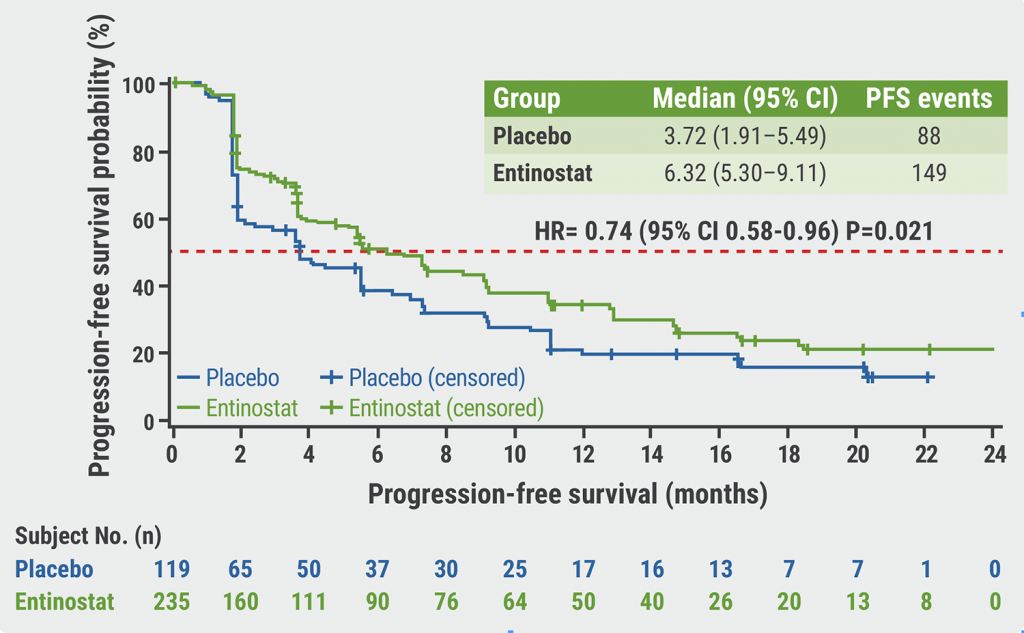Addition of the CDK4/6 inhibitor ribociclib to endocrine therapy significantly improves progression-free and overall survival in patients with locally advanced/metastatic HR-positive/HER2-negative breast cancer, as was shown in the phase 3 MONALEESA-2, -3, and -7 trials (NCT01958021, NCT02422615, NCT02278120) [1–3]. Based on data from these 3 phase 3 trials, 2 retrospective, exploratory analyses of the overall survival were done in subgroups of patients.
Prof. Lisa Carey (University of North Carolina School of Medicine, NC, USA) presented results of the association of intrinsic subtypes with overall survival using tumour samples pooled from all 3 trials [4]. The intrinsic subtyping was based on the gene expression profile of the tumour samples. Of 997 tumour samples that were analysed, 54.4% appeared to be Luminal A-type, 27.9% Luminal B-type, 14.7% HER2-enhanced, and 3.0% basal-like. Overall survival data were consistent in the intent-to-treat population (n=2,066) and the biomarker population (n=997). Intrinsic subtype was prognostic for overall survival, both with or without ribociclib: Luminal A>Luminal B>HER-enhanced>basal-like. In all subtypes but basal-like, ribociclib improved overall survival: HR 0.75 and P=0.021, HR 0.69 and P=0.023, HR 0.60 and P=0.018, and HR 1.89 and P=0.148, respectively.
“These pooled data show that ribociclib has consistent benefit in Luminal A, Luminal B, and HER-enhanced tumour types. Patients with basal-like tumours seem not to benefit from ribociclib. However, due to the small sample size these results should be interpreted with caution,” summarised Prof. Carey.
The second exploratory analysis evaluated the association between overall survival and location of metastases, number of metastatic sites, and prior therapy of patients in the MONALEESA-2 trial (n=668). Dr Joyce O’Shaughnessy (Baylor University Medical Center, TX, USA) presented the results.
Overall survival benefit of ribociclib in patients with or without bone-only metastases appeared to be consistent with that in the intention-to-treat population [5]. At 5- and 6-years follow-up, overall survival benefit of ribociclib was seen both in patients with and without liver metastases. Similarly, overall survival benefit of ribociclib was observed at 5- and 6-years follow-up with liver or lung metastases. In addition, overall survival benefit of ribociclib was independent of the number of metastatic sites and independent of prior (neo)adjuvant chemotherapy or endocrine therapy. “So, this exploratory subgroup analysis demonstrated benefit of ribociclib independent of metastatic side, metastatic number, and/or prior therapy,” concluded Dr O’Shaughnessy.
- Hortobagyi GN, et al. Ann Oncol 2021;32(suppl5):S1283–S1346.
- Slamon DJ, et al. N Engl J Med 2020;38:514–524.
- Im S-A, et al. N Engl J Med 2019;381:307–316.
- Carey LA, et al. Correlative analysis of overall survival by intrinsic subtype across the MONALEESA-2, -3, and -7 studies of ribociclib + endocrine therapy in patients with HR+/HER2− advanced breast cancer. GS2-00, SABCS 2021 Virtual Meeting, 7–10 December.
- O’Shaughnessy J, et al. Overall survival subgroup analysis by metastatic site from the phase 3 MONALEESA-2 study of first-line ribociclib + letrozole in postmenopausal patients with advanced HR+/HER2− breast cancer. GS2-01, SABCS 2021 Virtual Meeting, 7–10 December.
Copyright ©2022 Medicom Medical Publishers
Posted on
Previous Article
« Premenopausal women benefit from adjuvant chemotherapy next to endocrine therapy Next Article
The SERD elacestrant improves outcomes for patients unresponsive to endocrine therapy »
« Premenopausal women benefit from adjuvant chemotherapy next to endocrine therapy Next Article
The SERD elacestrant improves outcomes for patients unresponsive to endocrine therapy »
Table of Contents: SABCS 2021
Featured articles
Early-Stage Breast Cancer
Aromatase inhibitors outperform tamoxifen in premenopausal women
Concurrent taxane plus anthracycline most beneficial in reducing risk of breast cancer
Reduced risk of recurrence with ovarian suppression plus tamoxifen/exemestane
Metformin does not improve outcomes in patients with early-stage breast cancer
Omitting sentinel lymph node biopsy improves arm symptoms
HR-positive/HER2-negative Breast Cancer
Addition of palbociclib to standard endocrine therapy does not improve outcome in adjuvant treatment
The SERD elacestrant improves outcomes for patients unresponsive to endocrine therapy
Consistent overall survival benefit of ribociclib in advanced breast cancer
Premenopausal women benefit from adjuvant chemotherapy next to endocrine therapy
Promising anti-tumour activity of the CDK7-inhibitor samuraciclib plus fulvestrant
ctDNA is prognostic and predictive for response to ribociclib plus letrozole
Early switch to fulvestrant plus palbociclib beneficial for patients with ESR1 mutation
Triple-Negative Breast Cancer
Single-cell spatial analysis can predict response to neoadjuvant immunotherapy
Neoadjuvant pembrolizumab plus chemotherapy benefits event-free survival in TNBC
Early use of ctDNA testing can identify likelihood of relapse in TNBC
Pembrolizumab plus chemotherapy benefits patients with combined positive score ≥10
Neratinib plus trastuzumab plus fulvestrant shows encouraging clinical activity
Phase 1–3 Trials
Datopotamab deruxtecan shows promising anti-tumour activity
Trastuzumab deruxtecan outperforms trastuzumab emtansine
Nivolumab plus ipilimumab serve promising dual checkpoint inhibition
Entinostat plus exemestane improves progression-free survival in Chinese patients
Efficacy of pyrotinib plus capecitabine confirmed in previously treated patients
Basic and Translational Research
Using genomics to match treatments improves outcomes
Loss of ASXL1 tumour suppressor promotes resistance to CDK4/6 inhibitors
Inducers of ferroptosis are potential drugs to target p53-mutated TNBC cells
MAPK-pathway alterations are associated with resistance to anti-HER2 therapy
Genomic signatures of DCIS define biology and correlate with clinical outcomes
BRCA2 linked to inferior outcomes with CDK4/6 inhibitors plus endocrine therapy
Miscellaneous
Olaparib is well tolerated as an additional treatment
Race effects the likelihood to develop lymphoedema following breast cancer treatment
Sentinel lymph node staging is non-inferior to complete axillary lymph node dissection
One in 7 breast cancers detected during screening are overdiagnosed
© 2024 Medicom Medical Publishers. All rights reserved. Terms and Conditions | Privacy Policy
HEAD OFFICE
Laarderhoogtweg 25
1101 EB Amsterdam
The Netherlands
T: +31 85 4012 560
E: publishers@medicom-publishers.com


